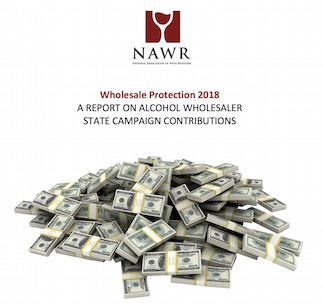 Our recent report on campaign contributions by America’s alcohol wholesalers outlines the astounding $107 million the middle tier has contributed to state political campaigns over the past five election cycles. The amount dwarfs what all other sectors of the alcohol industry have given in the same year. More importantly, the report is one clue as to how and why so many archaic, anti-competitive and protectionist alcohol laws remain in place: Wholesalers want them in place because they benefit wholesalers.
Our recent report on campaign contributions by America’s alcohol wholesalers outlines the astounding $107 million the middle tier has contributed to state political campaigns over the past five election cycles. The amount dwarfs what all other sectors of the alcohol industry have given in the same year. More importantly, the report is one clue as to how and why so many archaic, anti-competitive and protectionist alcohol laws remain in place: Wholesalers want them in place because they benefit wholesalers.
However, the report did not delve into the total amount of money America’s alcohol box movers have spent defending a regulatory system that inhibits growth and unjustifiably funnels money into the hands of middlemen.
During the same five election cycles, wholesalers have spent $30,000,000 in lobbying expenses just at the state government level, according to FollowTheMoney.org. Add to this the $22,000,000 that just two wholesaler trade associations, the Wine & Spirit Wholesalers of America and the National Beer Wholesalers of America, have spent on federal level campaign contributions, according to OpenSecrets.org. Together that’s another $52 million in addition to the $107 million spent assuring anti-competitive laws stay firmly in place.
On one level, the more than $150 million alcohol wholesalers have spent perverting what should be a fairly regulated market into a corrupt model of rent-seeking rules is an impressive accomplishment. For decades wholesalers have understood that without the protections written into the various states’ alcohol laws and regulations, they would be forced to reveal their actual value to the producer and retailer sides of the industry. Attempting such a thing in the age of instant communications and efficient logistics is a heavy lift. Wholesalers know this. Their spending is an outright effort to prevent the day when their actual value is made plain. In large part that effort has been successful.
In Texas, brewers of a certain size have learned that in order to sell their beer at their own brew pup, they are required to sell it to wholesalers first, then buy it back at a markup.
In a number of states, out-of-state wine retailers are prohibited from shipping wine to consumers in those states despite the fact that out-of-state wineries may ship into the state.
A number of states prohibit producers from changing their wholesalers….ever. However, the wholesaler can sell the rights to a brand to other wholesalers.
These are just some of the remarkably corrupt, inefficient, archaic and purchased regulations and laws that have resulted from the commitment of wholesalers to fund their lobbying and political contribution efforts.
The recently issued report is not a matter of whining about circumstances faced by producers and retailers in the alcohol world. It is sunshine. The report shines a light on the dynamics at play in the American alcohol industry.